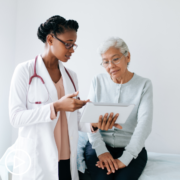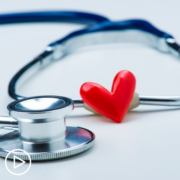Dr. Kami Maddocks: Why Is It Important for You to Empower Patients?
Dr. Kami Maddocks: Why Is It Important for You to Empower Patients? from Patient Empowerment Network on Vimeo.
What benefits can patients and care providers see from empowering patients? Expert Dr. Kami Maddocks from The Ohio State University Comprehensive Cancer Center explains benefits that she’s seen in her patients and ways that she helps encourage deepening of their knowledge and capacity for informed treatment decisions.
See More from Empowering Providers to Empower Patients (EPEP)
Related Resources:
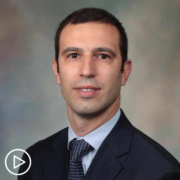
|

|
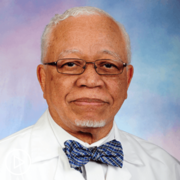
Dr. Isaac Powell: Why Is It Important for You to Empower Patients? |
Transcript:
Dr. Kami Maddocks:
I think empowering patients is so critical, because I think when they understand their disease better, the treatment options, or why they’re not receiving treatment and kind of what their journey could look like, that they overall do much better. I think when a patient comes in, I like to give them my explanation of their disease, make sure that I am answering all of their questions, information. Some patients have read a lot before they come in and some have not read a lot. I like to provide them with websites or areas of information that I know is accurate and up-to-date information and encourage them once they read that to give us a call.
We also provide them some written information and I have a 24-hour line. And I always encourage patients, I don’t know whether you’re getting treatment and having a side effect, whether you’re at home worrying about a symptom, whether you have a question about what’s going on, I don’t know that you’re worried unless you let me know.
So I like to encourage patients, if you have questions, concerns, please reach out. We also have a portal where patients can ask non-urgent questions if they’d rather have it in writing, but I think making sure that they know we’re here to help them. I think offering information on clinical trials, I encourage patients if they have questions or concerns on the information they’re provided that they think about second opinions.
And patients that I see for second opinions I like them to know that you’re getting great treatment locally or this treatment is something that you don’t have to drive here for if you need treatment. But I’m always available if there’s other concerns or something doesn’t seem right. So I think making sure that patients’ questions are answered. I think making sure that they are comfortable getting other opinions if they need to and making sure that they know that if they have concerns they should reach out and not worry or use Google but use us to help them.
Dr. Rafael Santana-Davila: Why Is It Important for You to Empower Patients?
Dr. Rafael Santana-Davila: Why Is It Important for You to Empower Patients? from Patient Empowerment Network on Vimeo.
What are some ways for cancer patients to be empowered by experts? Dr. Rafael Santana-Davila with the University of Washington School of Medicine shares his perspective and benefits of patient empowerment.
See More from Empowering Providers to Empower Patients (EPEP)
Related Resources:

|

|

Dr. Isaac Powell: Why Is It Important for You to Empower Patients? |
Transcript:
Dr. Rafael Santana-Davila:
An empowered patient is a patient that does better, because they know what’s going on. They have a better understanding of the disease. They’re better engaged. So how do you empower your patients? It’s a very difficult question to answer, because I don’t think that there’s a recipe to do this. And every patient is different. But what I try to do is to educate patients and know that these are hard conversations that a lot of it is going to be over their head. So you have to do a lot of re-education. And when I say over their heads, I’m not meaning that they are not smart enough to get it, it’s just they’re going through a lot. So you have to be simple with them. You have to meet them where they are and just do a lot of re-education and talking about the things that you think you’ve talked about, but many times they were thinking about something else, and they didn’t get it.
Beth Sandy: Why Is It Important for You to Empower Patients?
Beth Sandy: Why Is It Important for You to Empower Patients? from Patient Empowerment Network on Vimeo.
How can patients be empowered by cancer care providers? Expert Beth Sandy from Abramson Cancer Center shares her perspective and actions she takes to help activate patients in their care.
See More from Empowering Providers to Empower Patients (EPEP)
Related Resources:

|
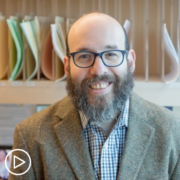
|

Dr. Isaac Powell: Why Is It Important for You to Empower Patients? |
Transcript:
Beth Sandy:
I think the best way for me to empower my patients is to be optimistic and to give them hope and because I’ve seen a lot of good stories. I also think one of the best ways to empower patients is to get to know them and who they are as a person and what is important to them, because then we can tailor our treatments and our discussions to what is important to them. I think another way to empower patients is to give them time to ask questions and frequently I’ll say, “Do you have any other questions?” I always ask that before we leave the room. “Do you have any other questions for me? Do you understand everything that we’ve said?”
Another way is to make sure they know how to get in touch with me. So I personally really like the online portal. So patients can send us messages through the portal, but they can certainly call as well. But make sure they know how to get in touch with you, because that’s something that can be really scary when you’re at home and you’re worried about something, and you don’t know how to get in touch with your care team.
Dr. Vinicius Ernani: Why Is It Important for You to Empower Patients?
Dr. Vinicius Ernani: Why Is It Important for You to Empower Patients? from Patient Empowerment Network on Vimeo.
Why is it vital for small cell lung cancer patients to be empowered by cancer experts? Expert Dr. Vinicius Ernani from the Mayo Clinic discusses the power of giving patients hope and the importance of clinical trials.
See More from Empowering Providers to Empower Patients (EPEP)
Related Resources:

|
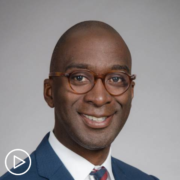
Dr. Yaw Nyame: Why Is It Important for You to Empower Patients? |
Transcript:
Dr. Vinicius Ernani:
So I think it’s always important to give the patient hope. It doesn’t matter how aggressive the disease is. I think the patients, they need to have hope to go home and continue moving with their lives. So again, small cell, it’s an aggressive disease, yes, but it responds very well to treatment. And now, we know that immunotherapy is there, it improves survival. We know that about 10 percent, 12 percent of the…50 percent of the patients are alive at one year after they start treatment. If you look at two years, there’s about 20 percent of the patients are alive. And if we look at five years, there’s about 10 percent of the patients that are alive with small cell. So we are seeing some progress with immunotherapy.
And again, I encourage, this is a disease that responds very quickly. It’s going to make you feel better very soon. I think that any patient with extensive stage small cell lung cancer deserves to be treated. And again, there’s more clinical trials coming with the immunotherapy, with the antibody drug conjugates. So hopefully, we’re going to continue to move the needle in small cell lung cancer.
Dr. Isaac Powell: Why Is It Important for You to Empower Patients?
Dr. Isaac Powell: Why Is It Important for You to Empower Patients? from Patient Empowerment Network on Vimeo.
What are some ways that cancer patients can be empowered by healthcare providers? Expert Dr. Isaac Powell from Karmanos Cancer Institute shares his perspective on ways patients can take charge of their health and situations that may be outside their control.
See More from Empowering Providers to Empower Patients (EPEP)
Related Resources:

|
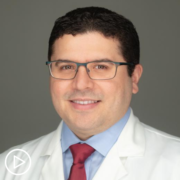
|

Dr. Yaw Nyame: Why Is It Important for You to Empower Patients? |
Transcript:
Dr. Isaac Powell:
I tell my patients that they have to take charge of their health. They have to talk to the doctor. You have to ask the doctor challenging questions. Then you have to do things that are going to help you as well. You have to be responsible for your own health, such as losing weight if necessary, such as exercising if necessary.
There are things that can cause things that you can’t control, like the pollution of the air and the water. But even in those situations, you need to challenge that and say, we need to do something about this polluted area where I’m living. And so those are the kinds of things that I discuss with my patients. Take charge of your health in every aspect.
Dr. Ronald Chen: Why Is It Important for You to Empower Patients?
Dr. Ronald Chen: Why Is It Important for You to Empower Patients? from Patient Empowerment Network on Vimeo.
Empowering patients and care partners is key to helping them to make informed care decisions. How can experts provide the right information about various options based on what matters most to the patient? Prostate cancer expert Dr. Ronald Chen with the University of Kansas Medical Center shares his approach to empowering patients so they can make the individual decision for them and their family.
See More from Empowering Providers to Empower Patients (EPEP)
Related Resources:
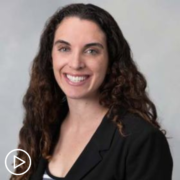
|

|

Dr. Yaw Nyame: Why Is It Important for You to Empower Patients? |
Transcript:
Dr. Ronald Chen:
I empower my patients by giving them the necessary information, so that patients and their caregivers are empowered to make the best decision for them. I think for every cancer patient, there’s always a balance that’s struck between how aggressive the treatment should be, and also how important quality of life is to them. And every patient may make a different decision among the different options that are available.
So as a physician, giving patients the right information about the different options and about the implications in terms of side effects and quality of life and survival is so important, so that each patient is empowered to make the individual decision for them and their family.
Dr. Yaw Nyame: Why Is It Important for You to Empower Patients?
Dr. Yaw Nyame: Why Is It Important for You to Empower Patients? from Patient Empowerment Network on Vimeo.
Patient empowerment is a vital part of care, but how can healthcare providers help? Prostate cancer expert Dr. Yaw Nyame with the University of Washington shares his approach to patient care and connections that he provides to help ensure optimal patient outcomes.
See More from Empowering Providers to Empower Patients (EPEP)
Related Resources:

|

|

Dr. Danielle Brander: Why Is It Important for You to Empower Patients? |
Transcript:
Lisa Hatfield:
Dr. Nyame, how do you empower your patients and their care partners? And why is that important?
Dr. Yaw Nyame:
I think the best way to empower patients and their care partners is just by giving them the time. My clinic always runs late…I’m not sure that’s something I should brag about but it always runs late, and when I come into a room, I always say, “I’m sorry, I’m running late.” I usually explain if someone needed more time before then, and I always end that with, “I’m going to give you the same time that you need to answer all your questions and have your needs met as the last person, and so don’t worry about what the clock says about when your appointment was supposed to be. Let’s just cover what we need to cover.”
I also jot quite a bit of notes, a lot of families come in with notebooks and they’re writing everything down, and I try to actually have some notes that are individualized to my patient, their particular cancer and what are my recommendations down on a sheet of paper that I give to them. It’s almost like a deliverable for that visit, which I think oftentimes takes the burden of the patient feeling like they’re the one that has to collect all this information, and it’s almost like I’m going to be in charge of collecting this and giving it to you at the very end of our visit.
And then lastly, I’m really big on trying to connect folks to the resources that they need socially or clinically, and so everyone gets a list of vetted resources to read more or to go back to if they have questions, everyone gets connected to advocacy organizations that I do work with and trust, and then lastly everyone gets my contact info, sometimes a cell phone number, sometimes an email, something where they feel like they can get reconnected to me. That’s my approach, some people would say that’s too much, but I find that the more ways I can allow patients to feel like I’m accessible, that I’m at their level, that I’m not some super human, whatever, but I’m just like their neighbors or friends, the people that are in their community, the more empowered they are to ask for the things that they need and ultimately have a better clinical experience and outcomes.
Dr. Danielle Brander: Why Is It Important for You to Empower Patients?
Dr. Danielle Brander: Why Is It Important for You to Empower Patients? from Patient Empowerment Network on Vimeo.
How can cancer experts help empower patients? Expert Dr. Danielle Brander from Duke Cancer Institute shares her approach to patient care through diagnosis and treatment and explains how patient empowerment helps in creating optimal care.
See More from Empowering Providers to Empower Patients (EPEP)
Related Resources:

|

|

Dr. Yaw Nyame: Why Is It Important for You to Empower Patients? |
Transcript:
Dr. Danielle Brander:
My hope or my goal from my first meeting together, and that could be around the time of their diagnosis. Sometimes we’re meeting because patients are referred to talk about treatment. Sometimes patients have had a few treatments, of course, if they’re being referred for a clinical trial or a novel course of therapy. And my hope from the very beginning is creating an environment or creating a conversation and relationship where first and foremost patients feel free and not hesitant to ask their questions. Because if there’s misunderstanding or a lack of understanding or patients don’t know what to look out for, then it’s really hard to really to help them, whether that’s treatment or empowering them on other aspects of their health. And sometimes those questions come up with the visits, sometimes they come up after.
I encourage them to bring them back for their follow-up visits. It’s okay to ask the same questions because they’re going to be at different paths and points in their CLL journey along the way. It’s important for them to be empowered because again, that helps us in tailoring their treatment. It helps us at understanding what they want, what their goals are in choosing a treatment or choosing a trial path.
And again, only the patient and their family or caregivers truly know what is best for them and for us to meet them where they are. But the other empowering things I tell patients is that, you know, when they ask their questions or when they bring forth their experience, it improves our understanding to help them. But it’s really through those conversations that we learn so much to help all our patients, to be quite honest. We hope through trials that gives us information, but we know trials can’t capture all of this. It’s these individual relationships. And so I tell patients that them sharing their experience really does help us tailor things for them. But really, I think, enriches the experience and the way that we can help everyone.
Dr. Sameh Gaballa: Why Is It Important for You to Empower Patients?
Dr. Sameh Gaballa: Why Is It Important for You to Empower Patients? from Patient Empowerment Network on Vimeo.
How can cancer experts help empower patients? Expert Dr. Sameh Gaballa from Moffitt Cancer Center shares his perspective about the role of physicians and why patient empowerment is essential in shared decision-making for treatment.
See More from Empowering Providers to Empower Patients (EPEP)
Related Resources:
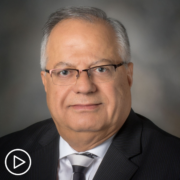
|
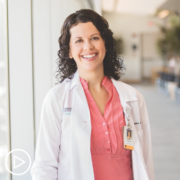
|
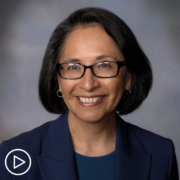
Dr. Ana Maria Lopez Why Is It Important for You to Empower Patients |
Transcript:
Dr. Sameh Gaballa:
So our role as physicians is really we have to put in front of the patient and also the referring physicians all the information and all the options. And at the end of the day, it’s really the patient’s choice. But our role is to try to walk them through it so that they have the…all the information and all the tools they need to make the right decision for themselves. Because not every patient is going to be the same. There’s always going to be other factors that we have to consider that the patient would really be the one that knows about them so social issues or someone who travels a lot or a caregiver situation.
So all these things, because we’re dealing with human beings at the end. So when we’re trying…we have to assess the whole patient’s situation, not just medically, but also from all other aspects to arrive at the correct decision. And again, at the end of the day, it’s really the patient’s decision to make the call. And we, again, we try to educate them on all the treatment options and all the data, so they really know why, what our recommendation is stemming out from.
Nurse Natasha Johnson: Why Is It Important for You to Empower MPN Patients?
Nurse Natasha Johnson: Why Is It Important for You to Empower MPN Patients? from Patient Empowerment Network on Vimeo.
What are some ways that myeloproliferative neoplasm (MPN) oncology nurses and other MPN care team members can aid in empowering patients? Oncology nurse practitioner Natasha Johnson from Moffitt Cancer Center how she helps patients and their loved ones become more involved in care and treatment decisions.
See More from Empowering Providers to Empower Patients (EPEP)
Related Resources:

|

|

Dr. Ana Maria Lopez Why Is It Important for You to Empower Patients |
Transcript:
Natasha Johnson:
So I’m an encourager, so I will encourage patients to be involved, get their loved ones involved, educate themself on the disease on the common symptoms, on treatments, and then ways to alleviate those symptoms. So I would encourage them too, to keep on living. Let’s do what we can to improve the symptom burden so you can keep on living. And I think this is important, because I believe that empowered patients are very well-informed, and they are the top key player in their care. They’ll share their goals of care, which makes them better prepared to work with the healthcare team to create an individualized plan of treatment for them.
Dr. Gabriela Hobbs: Why Is It Important for You to Empower MPN Patients?
Dr. Gabriela Hobbs: Why Is It Important for You to Empower MPN Patients? from Patient Empowerment Network on Vimeo.
What are some ways that can myeloproliferative neoplasm (MPN) care providers can help empower their patients? MPN expert Dr. Gabriela Hobbs from Dana-Farber/Harvard Cancer Center shares her perspective of how she educates her patients. Dr. Hobbs explains her methods of empowering all her patients in their care – whether they’re newly diagnosed, needing long-term MPN care, or going on to seek care from other clinicians.
See More from Empowering Providers to Empower Patients (EPEP)
Related Resources:

|

|

Dr. Ana Maria Lopez Why Is It Important for You to Empower Patients |
Transcript:
Gabriela Hobbs, MD:
I think that empowering patients is really important in developing an excellent longitudinal relationship with an MPN patient. And the way that I like to empower my patients is through education. And that starts with the first meeting with the patient when they’re recently diagnosed, or maybe they’re seeking you out for another opinion because maybe something is going not well with their disease.
And so that first visit, I really like to spend a lot of time educating about what MPNs are, the different types, the things that we worry about, the possibility of disease progression, and then spending a lot of time talking about the different treatment options that exist. As well as spending a lot of time talking about how patients can maximize their quality of life with both pharmacologic interventions as well as lifestyle modification. And so education really is at the center of empowerment for patients.
And I think that that gives them a lot of control over their disease and prepares them for additional visits with me or with other clinicians if they’re seeking other care from other clinicians as well, especially those patients that maybe travel from far away. And so education during that visit is important, but also talking to patients about how to prepare for additional visits. So I talk to patients a lot about taking track of their symptoms, keeping track of how they’re feeling, how they feel with the medication, with perhaps a change in medication, how they feel like their symptoms are changing over time. Talking to them about the MPN symptom assessment form, and making sure that they can utilize that form to keep track of how they feel.
And then also asking questions…If they don’t ask questions during the encounter, make sure that they write down those questions in a notebook so that when they do go to see their clinician at the next appointment, they can make the most of that encounter by knowing that they’re going into that encounter, prepared with questions and able to summarize the way that they’ve been feeling over the last couple of weeks or months since their last appointment. So education is really always at the center of empowerment.
Empowering Providers to Empower Lung Cancer Patients
Empowering patients is at the heart of efforts at Patient Empowerment Network (PEN), and work toward reducing health disparities is part of conversations among healthcare professionals. Precision medicine and the use of biomarker testing is one area of interest in efforts to eliminate healthcare disparities.
With this in mind, PEN has taken on a new initiative, the Empowering Providers to Empower Patients (EPEP) initiative. Starting in lung cancer, the program expands PEN’s reach to healthcare professionals with the goal of improving physician-patient communication; shared decision-making; and the role that lung cancer patients, survivors, care partners, and healthcare professionals each play in the shared decision-making process.
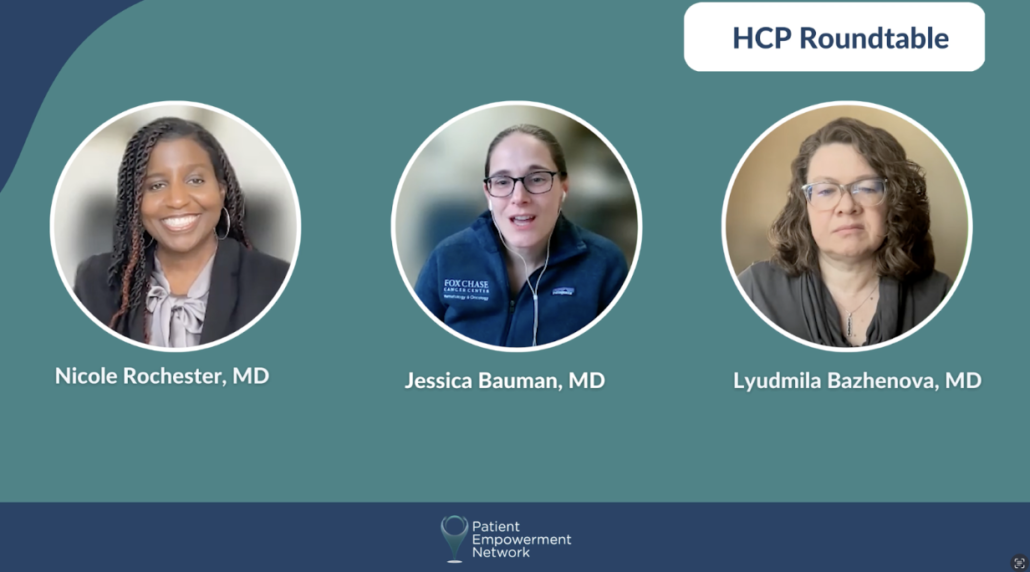
The EPEP initiative includes the following resources:
- Needs Assessment outlines key factors that enable patient empowerment, attributes of an empowered patient, and advice for healthcare professionals to perform a needs assessment for each patient.
- EPEP Roundtables with lung cancer experts Dr. Heather Wakelee, Dr. Lyudmila Bazhenova, Dr. Leigh Boehmer and Dr. Jessica Bauman as they discuss a range of topics including ways to improve physician-patient communication, learnings from tumor boards, collaboration between academic and community oncologists, biomarker testing, and addressing barriers to biomarker testing.
- EPEP Vignettes where lung cancer clinician Dr. Jhanelle Gray from Moffitt Cancer Center shares her experience in biomarker testing, personalized combination therapeutics, and best practices in treating and empowering patients toward more equitable and culturally sensitive care.
- EPEP Biomarker Testing Resource Guide that covers benefits of biomarker testing, when to test, dos and don’ts of biomarker testing, perspectives from a patient and a clinician, and resources for patients.
- EPEP Portal utilizes PEN’s robust resource library and that of numerous trusted advocacy partners to create a vetted list of patient education resources. PEN delivers a curated PDF according to your interests and delivers it efficiently to your inbox.
- Infographics that address the differences between cultural competence versus cultural humility and key steps to work toward practicing cultural humility to help empower your patients in their lung cancer care.
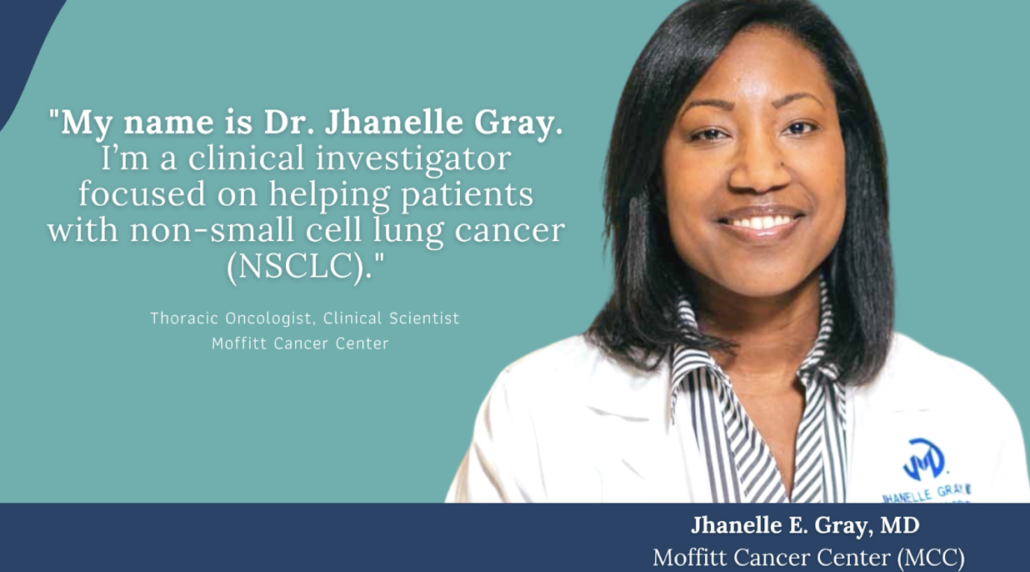
Key Takeaways to Help Empower Lung Cancer Patients
PEN had the opportunity to interview experts Dr. Jhanelle Gray, Dr. Heather Wakelee, and Dr. Leigh Boehmer to learn about some of their expertise. They shared their perspectives about vital ways that they work with patients to help empower them and to work toward the best personalized care for each patient.
Dr. Boehmer shared the importance of biomarker testing to identify driver mutations, “…more than half of patients who’ve developed lung cancer who have never smoked or have a light smoking history are going to have an actionable driving mutation, and even in people who do have a smoking history, of any ethnic background, they’re still 10 to 20 percent or maybe more as we identify more of these driver mutations, where that’s what’s really the force in the tumor.
And if you find it and you can start someone on the appropriate targeted therapy, usually across multiple trials, the toxicity is less than you would get with chemotherapy or immunotherapy…the probability of response is over half, you know, if someone’s going to have a benefit that that’s going to help them feel better for a period of time in controlling their cancer, it really drastically changes their whole tumor outcome, they’re going to be living longer, feeling better, and ultimately that’s our goal when we’re helping someone with metastatic disease…You have to have the physician aware of the importance of finding the mutation, altering the treatment as necessary, and giving that patient the best possible option for care.”
Dr. Gray and Dr. Boehmer also have preferred medical terms when they explain to their patients about biomarker testing. Dr. Gray prefers to steer away from terms that have to do with genomics or genetics and uses the terms “biomarker testing” or “comprehensive biomarker testing” instead. While Dr. Boehmer shares, “I think that’s really important that people always remember to talk about the tumor and not about the mutation in the person, that’s really, really critical.”
Physician Best Practices for Biomarker Testing
With her experience in using biomarker testing in planning personalized combination therapeutics, Dr. Gray shares advice for other healthcare providers. “I think for a provider it is going to be very important when a patient is newly diagnosed with non-small cell lung care especially when they have advanced and later stages as this should be a comprehensive test. This should be a certified assay. I think they should also look at turnaround time for this testing, does the assay include a liquid biopsy portion and a tissue biopsy portion? Is there one that you want to run before the other?
Many times what I will do when I meet a patient initially and they have an advanced or metastatic stage non-small cell lung cancer, I’ll send off the liquid biopsy right then and there, the same day in the hope that I can get the test results back within 7 to 10 days. I will also order the tissue testing. Should the liquid biopsy results from the blood specimen come back sooner, then I can cancel the tissue testing if I feel confident enough in the results. This will then preserve tissue for later analyses. It can also preserve tissue should they need to enroll in an innovative clinical trial and expand their therapeutic options.”
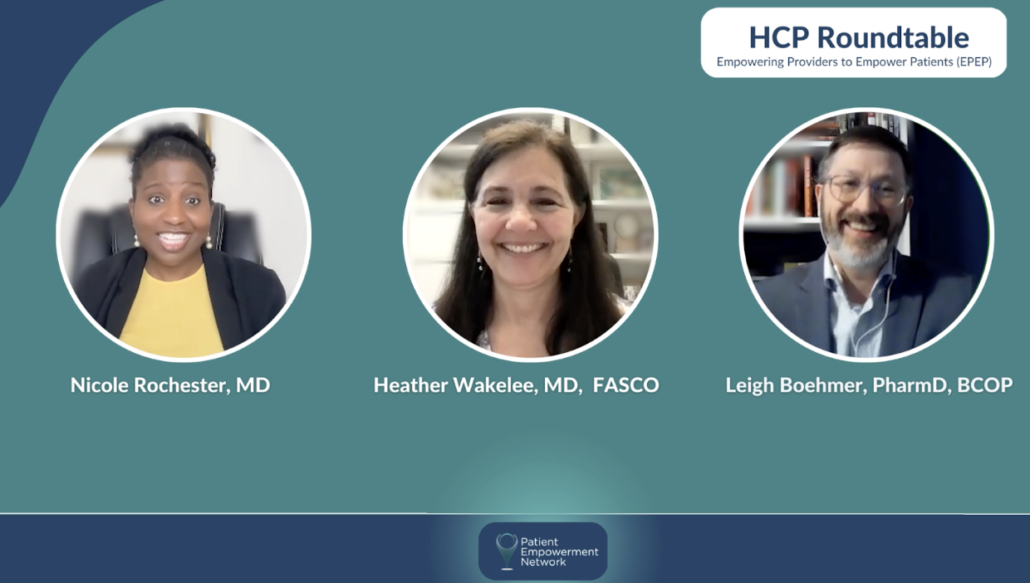
Advocacy for Biomarker Testing
Dr. Wakelee speaks to advocacy for biomarker testing, “…many organizations, including IASLC, including ACCC, including NCCN…I mean, you could name any organization that’s involved in cancer care and education, is really focusing on this issue of making sure that every oncologist knows the importance of doing biomarker testing for patients with non-small cell lung cancer, that we are trying to expand that not just to the oncologist, but also to the folks making the diagnosis, so they can be aware as well…The more people who are aware that’s a standard of care in treating lung cancer, the more that’s going to happen, and then continuing to explore those financial barriers, and as more agents are FDA-approved, where that becomes a preferred first sign option, but you only know that if the testing’s happened, that leads to campaigning to make sure that the testing is being covered as well.”
Dr. Boehmer further explains about the logistics of advocating for biomarker testing. “ACCC…recognizes that a lot of community programs don’t have kind of operational best practices for how to incorporate biomarker testing into a patient’s journey…we’re working on creating care pathways which will help multidisciplinary clinician teams integrate discussions of biomarker testing and its impact at various critical time points along a patient’s diagnosis to treatment, to survivorship or end-of-life care…talking about when and how to have meaningful conversations, and then doing it with health-literate, vetted resources and through a lens of equity and shared decision-making, because you look like me, you had success with it. I’m going to do it for my at-risk patients as well, because one, it’s the right thing to do. And two, you taught me how to do it, and three, you told me what success looks like so I can measure myself against you, and that’s a successful model for scalability.”
And Dr. Gray shares advocacy organizations and ways to move toward biomarker testing equity for all patients. “For those again who are having some difficulty with getting biomarker testing for their patients, I would strongly encourage you to find an advocacy organization such as American Lung Association, LUNGevity, GO2 Foundation, there are many many others out there that are very much interested in improving access to patients with non-small cell lung cancer. This is really a critical area of need and that we really have to drive forward with healthcare equity in this setting…And so, I think putting all this together and coming together as a field is where we can move together and with the patients, the providers, and the advocacy organizations I think that we should all feel empowered to move the needle forward for our patients.”
The bottom line is, while oncologists have more tools to treat lung cancer, access and language remains a big factor in biomarker testing. Comprehensive biomarker testing can play a very important role in the personalized treatment for patients with non-small cell lung cancer (NSCLC), but many questions remain. How do we improve clinician-patient conversations in biomarker testing? And how do we remove barriers that can impede an HCP’s ability to treat patients with personalized care? As the lung cancer field continues to experience tremendous growth in precision medicine, we hope healthcare providers can take advantage of these timely resources of the EPEP initiative to work toward equitable and culturally sensitive care for lung cancer patients.
Empowering MPN Providers to Empower Their Patients
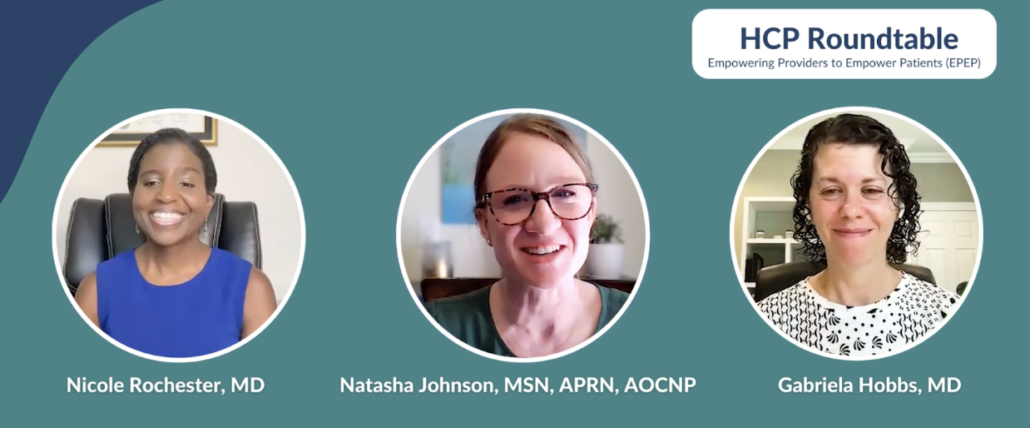
Empowering patients is at the heart of efforts at Patient Empowerment Network (PEN), and work toward reducing health disparities is part of conversations among healthcare professionals. With this in mind, PEN has taken on a new initiative for myeloproliferative neoplasms (MPNs), the MPN Empowering Providers to Empower Patients (EPEP) initiative. The program expands PEN’s reach to healthcare professionals with the goal to improve physician-patient communication; shared decision-making; and the role that MPN patients, survivors, care partners, and healthcare professionals each play in the shared decision-making process.
The EPEP initiative includes the following resources:
- Needs Assessment outlines key factors that enable patient empowerment, attributes of an empowered patient, and advice for healthcare professionals to perform a needs assessment for each patient.
- EPEP Roundtables with Dr. Nicole Rochester and MPN experts Dr. Gabriela Hobbs and Natasha Johnson as they discuss a range of topics including how to help your MPN patients play an active role in managing their care, healthcare provider recommended strategies for managing disease burden, the importance of advanced practice clinicians on the MPN health care team, clinical trials and why it’s vital for nurses to address this topic with patients and families, and cultural humility in action.
- EPEP Resources provides the resource guide, infographics, blog, and other resources to improve patient care
- EPEP Portal utilizes PEN’s robust resource library and that of numerous trusted advocacy partners to create a vetted list of patient education resources. PEN delivers a curated PDF according to your interests efficiently to your inbox.
Key Takeaways to Help Empower MPN Patients
PEN had the opportunity to interview experts Dr. Gabriela Hobbs and Natasha Johnson to learn about some of their expertise. They shared their perspectives about vital ways that they work with patients to help empower them and to work toward the best personalized care for each patient.
The art of listening to patients is an essential part of empowering patients in their care journeys. Expert Dr. Gabriela Hobbs from Massachusetts General Hospital shared her perspective about listening. “…I think knowing where your patient is emotionally, what’s important to them, what are their worries, is really important, so you can have a conversation where you’re not just speaking about the things that you as a provider think is important, but really also listening to where the patient is coming from, and so that you can make sure that you’re appeasing their anxieties and whatever decision you make is consistent with both what you think is medically important, but also with what’s really important for the patients. I think listening is really at the core there.”
Of course, nurse practitioners often serve as valuable members of the MPN care team. As a nurse practitioner, Natasha Johnson shared her perspective in empowering MPN patients. “…I think that we spend a ton of time educating them to make sure that they really understand this disease, the symptoms that go along with it, the treatments that go along with that, and once we have a good confidence that they understand everything, lead them into discussing what their goals of care are, and then we take all that information together, and we create a treatment plan specific to that patient, really aiming to improve their quality of life and overall survival.”
Johnson also shared about the benefits of seeing an MPN specialist. “…I really think there’s a benefit to seeing an MPN expert that is at a national cancer center, academic center. I do think there is some more time allotted to those visits, especially the consults and first appointments for the patient, and we kind of start this with my doctor and other providers of assessing how much does the patient even know to begin with? So that can direct us where to start. And then how deep do they want to go.”
Helping to educate MPN patients, of course, can take a variety of different forms. Johnson explained some of the actions that she takes to help her patients. “…I write a lot of things down for my patients when I see them, I think visuals are really helpful, provide literature, I tell them what websites to visit. A lot of times, they just Google their doctor, which is great because they can find them and listen to their own lectures, and they really learn a lot. So just guiding them to those resources. I do think it’s important, too, to give them something like the total symptom score form. Just having that visual of, these are what is common, and then they can think about that between visits, but I think all of those things really help to educate them and get them involved.”
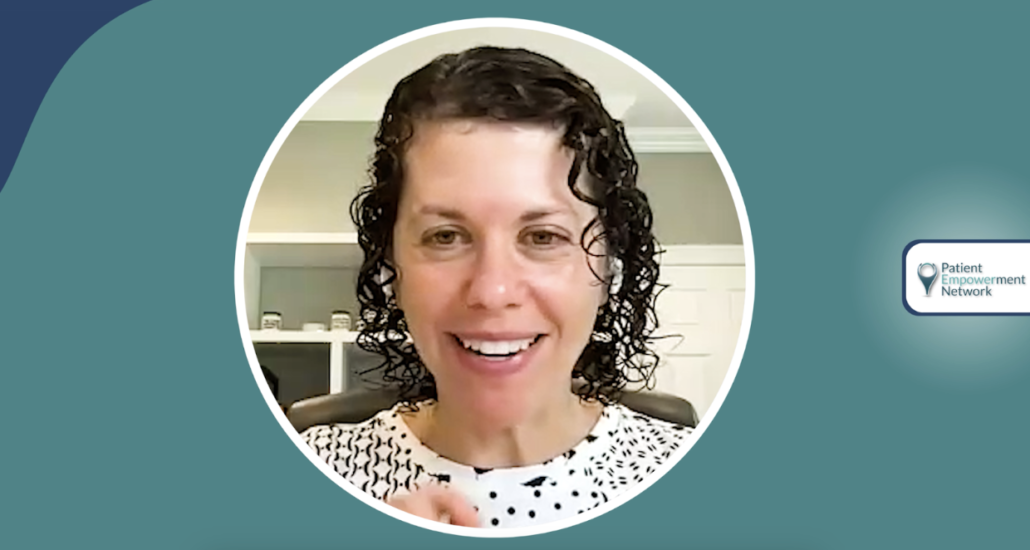
MPN Care Team Best Practices for Patients
Tracking symptoms and preparing for office visits are key tasks for MPN patients. Dr. Hobbs explained how essential these tasks are for patient empowerment. “…for those patients that are very symptomatic, for example, keeping track of their symptoms over time, writing down notes about how they felt, what they think made something better, made something worse, how they’re responding to these medications, questions that they may have, and writing all of that down helps them be more empowered patients. They can advocate for themselves in a more organized way when they do go see either me or another clinician. So they come in fully prepared with the information and the questions that they want to get out of that visit.”
Dr. Hobbs has experienced the value of the symptom assessment form. “I think clinicians are busy and sometimes feel like having a tool to ask those questions is maybe too burdensome. I personally find that the MPN symptom assessment form is a quick form, it’s easy to complete, it can be given to a patient, there’s a piece of paper while they’re waiting for you.”
And Dr. Hobbs shared the benefits she’s experienced with the use of the form. “And that also directs the conversation because it really just gives numbers, makes it objective, and then can really start that conversation. And so remembering that we do have this tool, it actually can help cut down time to the visit and make it more focused, and it’s helpful to…empowers the patient and make sure that you really are asking about all of those symptoms, and just making sure that you don’t just assume that a patient has or doesn’t have a symptom, but really saying, ‘Are there any other symptoms that you’ve noticed?’”
Dr. Hobbs has also witnessed the value of care partners being involved in MPN care conversations about symptoms. “…the spouse is like, ‘But remember, you really haven’t been having your dinner, and remember how you were complaining about how your stomach was hurting every time you ate. And you say you’re not itchy, but every night when we’re watching TV, I turn around and I see that you’re scratching.’ And so I think that’s also a really important tool to make sure that you make use of the family members, because they really know what’s going on if the patient is not willing to share as much or doesn’t like to complain.”
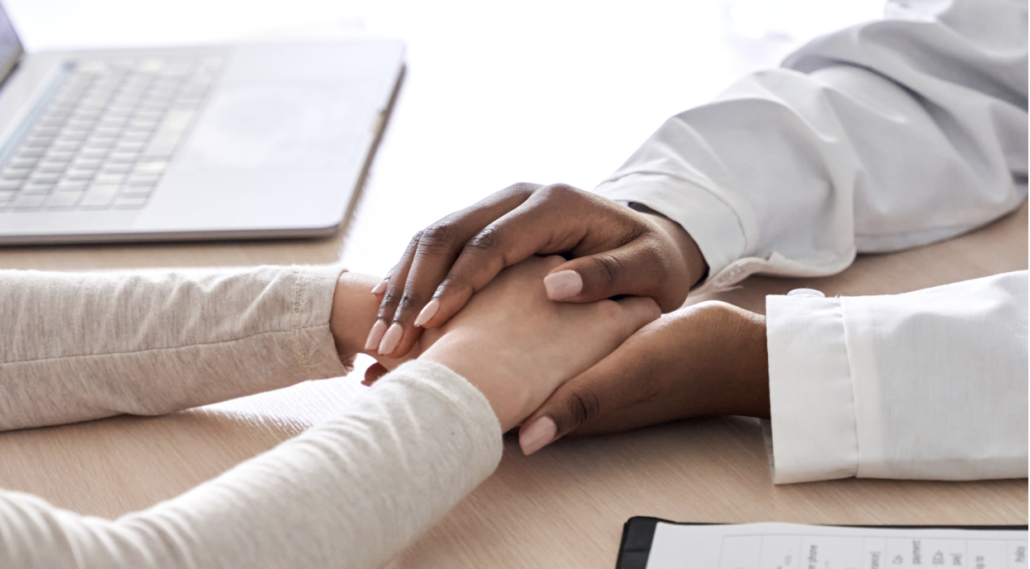
Advocacy for Cultural Humility
Cultural humility is a process of listening and learning about patients. Dr. Hobbs shared her perspective. “…there’s all sorts of history in this country, especially about clinical trials. And I think coming into those encounters, like I said at the beginning of our conversation, taking into account that you really do know your patient. But sometimes, you don’t know the patient as well. You’re getting to know them, and you need to make a decision. Just listening, being humble, being aware, trying to understand where the patient is coming from.”
Dr. Hobbs continued to share about taking this vital time to learn about your patients’ ways of thinking. “I think sometimes, especially when you’re trying to make a decision quickly and you find that there’s some friction, I think taking some time to say, ‘Alright, where is that coming from?’ And perhaps I’m coming across too strong with this recommendation to do this clinical trial and there’s maybe something that I need to explore, and so just keeping an open mind and trying to just ask questions, ‘Where are you coming from? What’s important to you? Why are you hesitating? Or is there something that I can explain in a different way?’”
Even though MPN treatments have experienced increases in quantity and efficacy of treatments, vital HCP best practices can go a long way in empowering MPN patients.How can you help your MPN patients play an active role in managing their care? How do we improve clinician-patient communication about symptoms? How should fellow MPN specialists explain disease progression to patients and care partners? We hope healthcare providers can take advantage of these timely resources of the EPEP initiative to work toward equitable and culturally sensitive care for all MPN patients.
See More from MPN | Empowering Providers to Empower Patients (EPEP)
Explaining Myeloproliferative Neoplasm Disease Progression to Patients
Explaining Myeloproliferative Neoplasm Disease Progression to Patients from Patient Empowerment Network on Vimeo.
What is the best way to explain disease progression to myeloproliferative neoplasm patients? MPN experts Dr. Gabriela Hobbs and Natasha Johnson share advice on how they work with patients and families to clearly explain disease progression.
Dr. Gabriela Hobbs is a hematology-oncology physician specializing in the care of patients with myeloproliferative neoplasms (MPN), chronic myeloid leukemia, and leukemia. Dr. Hobbs serves as clinical director of the adult leukemia service at Massachusetts General Hospital and is an assistant professor at Harvard Medical School.
Natasha Johnson, is an Advanced Oncology Nurse Practitioner at Moffitt Cancer Center, where she cares for people living with MPNs with kindness, patience, and humanity. Natasha also speaks at conferences to educate other healthcare professionals about MPN care, research, and treatment.
See More from Empowering MPN Providers to Empower Patients (EPEP)
Related Resources
Transcript:
Nicole Rochester, MD:
I wanted to shift again and start to talk about specifically disease progression. And we know that that is, unfortunately, something that is an important element of MPNs. And so as we talk to fellow MPN specialists, what are you all’s recommendations for how they can best explain disease progression to patients? Are there any specific languaging or specific tactics that you all use, and even things that maybe you shouldn’t say as you are sharing information about disease progression? Either one of you, feel free to go first.
Gabriela Hobbs, MD:
So disease progression, I think is a really challenging topic, because on the one hand, I think it’s really important to educate patients. It’s really important for patients to know that that is a possibility, that it is something that can happen. It’s really challenging to have a patient that has lived with this disease for a long time, hardly even knows the name of that disease. Maybe they were seen elsewhere, etcetera, and then all of a sudden, something’s going wrong and they just weren’t prepared for that. But I feel like that really does need to be balanced by the fact that, thankfully, progression happens infrequently. And so you also…going back to what we were saying before, you want to help a patient to be able to live well with these diseases and not be defined by those diseases. And so one of the things that I try to do with patients is, especially during that initial visit, I spend some time explaining to them what the disease is, that it can progress to myelofibrosis, that it can progress to leukemia. But then I also try to reassure them as much as possible that this is an infrequent event, that the reason why we follow patients in-clinic is so that we can start to notice if there’s disease progression, that it usually happens gradually.
And then I try to say, “You have this information. We can’t necessarily change that at this moment, there are maybe some tools that we can use in the future, but try to put that information in a box in your brain, put the key, put it away, try not to think about that every day when you’re outside of here. Definitely okay to open that back up when you’re with me in the room. If you want to get those anxieties out, that’s fine, but let’s really try to make sure that that’s in the back and not at the forefront of our thoughts.” And kind of going back to one of the things we were discussing before about what the patient thinks is most important, what the clinician thinks is most important. If you ask patients what are they most concerned about with their MPN, oftentimes that response is, “Is my disease going to progress?” And so I think acknowledging that and talking about that is important, but then also reminding patients that over time, they need to, hopefully with your help, or maybe they need additional assistance with therapists or social workers, etcetera, let’s find a way to put that away so that it’s not really at the forefront of our thoughts every single day, because that also ends up being not productive.
Nicole Rochester, MD:
I love that approach, of providing the education, but also that balance that you talked about, Dr. Hobbs. I love the idea of putting it away, putting it in a box [chuckle] and locking it, and then opening it back up when you’re in the safety with your healthcare provider. That’s beautiful.
Do you have anything to add to that, Ms. Johnson?
Natasha Johnson:
I completely agree. Your example there of putting it in the box, I’m going to use that in clinic. [laughter] I think it’s a great visual for patients. Because like you said, they’re very scared, and it can control them and take over, and we don’t want the disease to take over their life. Still live. Enjoy.
Share Your Feedback:
Create your own user feedback survey

